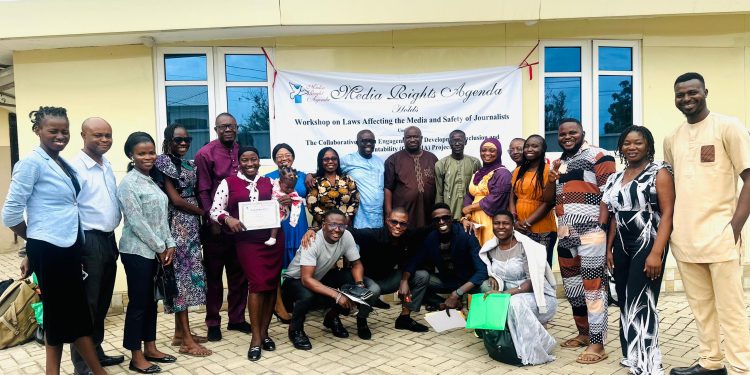Media Rights Agenda (MRA) has concluded a two-day workshop on laws affecting the media and the safety of journalists in Nigeria, to provide journalists with an understanding of the legal framework governing the media in Nigeria and offer guidance on compliance and professional conduct.
The training, which was organized with support from the Wole Soyinka Centre for Investigative Journalism (WSCIJ) and funded by MacArthur Foundation, brought together about 30 media professionals across the South West.
In his opening remarks, MRA’s Executive Director, Mr. Edetaen Ojo, emphasized the importance of the workshop especially because of the rapidly evolving media landscape in Nigeria.
Mr. Ojo highlighted the necessity for journalists to remain well-informed about the latest developments in media laws, ethical standards, and technological advancements. He noted that such knowledge not only enhances journalists’ ability to report accurately, responsibly, and fairly but also strengthens public trust and upholds democratic principles.
“By investing your time in participating in such a programme, you do not only improve your competence and confidence, but you can also be more resilient and innovative, which in turn strengthens the overall quality of journalism and its critical role in informing and empowering the public,” he added.

According to him, the workshop aims to deepen participants’ understanding of the legal landscape governing journalism and to equip them with the skills necessary to navigate these laws effectively and ethically. Topics to be covered include national, regional, and international frameworks on freedom of expression, media freedom, and the safety of journalists; digital security; ethics in journalism; and avenues for obtaining legal and litigation support.
Mr. Ojo acknowledged the challenges journalists face at work, often navigating a complex web of laws and regulations that can impede their ability to report on sensitive or critical stories. He stressed the importance of understanding media laws to protect journalists’ rights and freedoms and to foster ethical journalism.
“A good understanding of the legal landscape will, in our view, empower you to confront and navigate these realities. Knowledge of media laws can help you as journalists to protect your rights and freedoms, ensuring that you can operate without undue interference or fear of retribution,” he said.
The workshop covers a variety of topics such as an overview of national, regional and international frameworks on freedom of expression, media freedom and safety of journalists, legal frameworks inimical to media freedom in Nigeria, understanding digital security and common digital threats to journalism practice, ethical imperative in journalism practice in Nigeria, beneficial legal frameworks for journalists and the media in Nigeria, avoiding legal liabilities as a journalist, protecting information, systems, confidential sources and contacts, and avenues for legal and litigation support to journalists.
These sessions were taken respectively by Mr Ojo, the Head of MRA’s Legal Department, Ms Obioma Okonkwo, and the Programme Officer, Ms Esther Adeniyi.
Speaking about the importance of the training, one of the participants who works with Rave FM/WSTV, Lydia Adegbaju, said training has equipped her to pay attention to cyber security, firewalls, multiple storage for her works.
Adegbaju explained the training has helped her to become aware of how to avoid legal liabilities as a journalist, laws that protect her in her line of duty and as a citizen, and the available legal and litigation support to journalists.

Participants engaged in a session during the workshop.Adetutu Sobowale, a reporter with The Punch also expressed her delight, saying, “the workshop exceeded my expectations, offering an eye-opening and highly insightful experience that every practising journalist should undergo. Every aspect of the workshop was valuable. I was particularly excited to learn about laws I had never encountered before.”
She noted that even though media rights are protected under some laws and Acts, this protection is not guaranteed, which according to her is quite discouraging.
At the end of the workshop, the participants agreed to a set of important recommendations such as regular training for journalists on relevant laws and regulations, improved digital security measures to protect sensitive information and sources, constitutional amendments to guarantee media freedom, collaboration among media stakeholders to create a supportive legal environment, government and law enforcement should stop using laws to harass journalists, and establishment of a legal support fund for journalists facing legal challenges.
Participants condemned the harassment of journalists covering protests and called on authorities to protect journalists and ensure those responsible for attacks are brought to justice. They also stressed the importance of solidarity among media organizations to address common threats and challenges.

